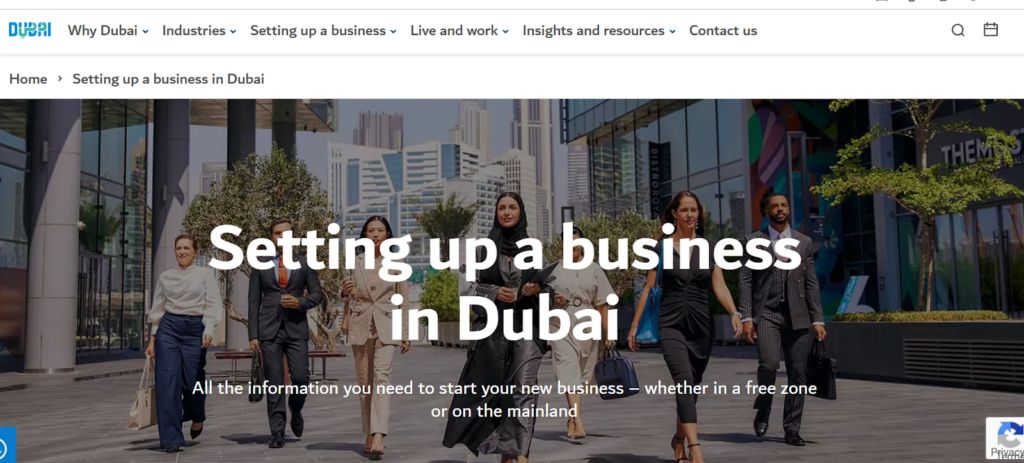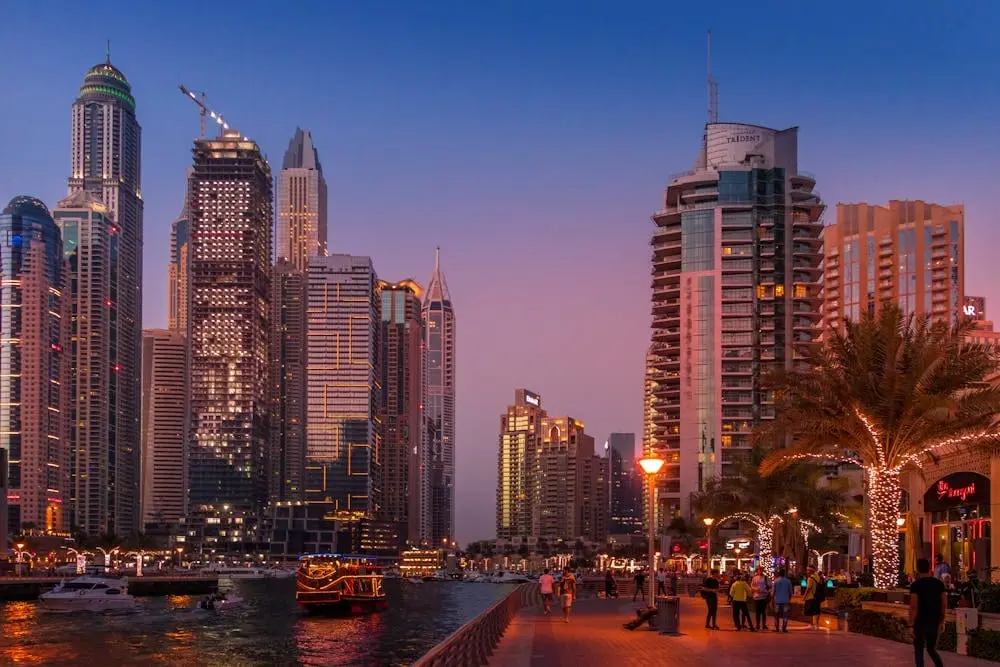Office Time
Mon-Sat: 8am to 8pm


Dubai is one of the world’s most exciting cities for business startups. It’s 2025, and things have never looked better for entrepreneurs in UAE.
What’s best? You can now own 100% of your business in many industries; no local partner is needed. Economic growth, friendly policies, and plenty of opportunities are available in Dubai.
If you are eager to know how to start a business in Dubai then this article is what you are looking for.
Table of Contents
In true words, Dubai 2025 will be a paradise for entrepreneurs and investors. This is not a city; it is a global nexus of business and entrepreneurship.
There are several advantages to starting and developing a business in Dubai: 100% foreign ownership of companies, no personal taxes, and a 9% corporate tax.
As part of the ambitious Dubai Economic Agenda D33 goals, the city thirsts for business. Undoubtedly, it has now become a dream location for global entrepreneurs. Let’s see why:
As we all know that, Dubai is an ideal city where you can fully realize your business dreams. In 2021, FDI statistics show Dubai received AED 15.9 Billion, showing its global attractions.
Starting is always challenging, but having the right tools and documents can transform it. You can easily integrate into the Dubai economy with these documents like a passport. Let’s see what type of documents you’ll need:
These documents ensure a smooth and legal business setup in Dubai
Actually, to set up a business in Dubai, approvals from various ministries and authorities are required depending on the type of business activity and location.
Below is a table listing key authorities involved in the approval process:
| Authority/Ministry Name | Approval Purpose |
| Department of Economic Development (DED) | Trade license issuance and initial approvals for business setup. |
| Dubai Municipality | Approvals for health, safety, and environmental compliance. |
| Dubai Health Authority (DHA) | Licensing for healthcare providers and medical facilities. |
| Ministry of Economy (MOE) | Handles intellectual property, foreign investment, and economic activity registrations. |
| Knowledge and Human Development Authority (KHDA) | Approvals for educational institutions and training centers. |
| Dubai Civil Defence (DCD) | Fire safety and building compliance approvals. |
| Telecommunications and Digital Government Regulatory Authority (TDRA) | Type approval for telecom equipment and services. |
| Security Industry Regulatory Authority (SIRA) | Approvals for security systems in businesses like jewelry stores. |
Check out the simple steps to start your business in Dubai. We will try to show you with the perspective of how to open a business in dubai as a foreigner.
Pick the right niche is essential when starting a business. Dubai allows more than 35,000+ business activities, including tourism, trading, consultancy, and even manufacturing. If it is a consultancy firm, the activity selection should be professional to ensure proper licensing.
| Quick Tip Always ensure that your chosen niche is aligned with what is being demanded in the market. It always helps in growth to do so. |
Limited Liability Company (LL): Only 2-50 investors must have limited liability, and it is easy to register.
Free Zone Company enables total ownership and investment for foreigners and tax-free benefits. But it is limited to operations within the Free Zone.
Offshore Company: Suitable for businesses with international dealings or tax-saving strategies without a Dubai office.
Tourism Business: Provides hospitality services, travel agencies, and event management due to Dubai’s high tourism standards.
E-commerce Business: It benefits greatly from Dubai’s internet infrastructure boom and online consumption.
Real Estate Brokerage or Development: This industry is set to grow 5 percent yearly and is a lucrative investment.
Indeed, starting a business in Dubai offers incredible opportunities, but one of the first decisions you’ll need to make is selecting the right business zone. Each zone—Mainland, Free Zone, and Offshore— suits to specific needs.
So, understanding their features, benefits, and limitations will help you make the best choice. Let’s explore these zones in detail, so you can confidently take the next step toward your entrepreneurial goals.
Mainland companies are regulated by the Department of Economic Development (DED) and offer the most flexibility. If you’re looking to trade across the UAE and internationally without restrictions, this is the ideal choice.
Key Features:
Dubai’s Free Zones are adjusted to attract international businesses with their specialized offerings. With over 30 Free Zones, you’ll find options for industries like technology, logistics, media, and finance.
Key Features:
Offshore companies are ideal for international operations without requiring a physical presence in the UAE. They’re regulated by jurisdictions like JAFZA Offshore and RAK ICC.
Key Features:

Actually, proper documentation isn’t just a formality! It’s the foundation of your business’s success. It ensures:
Now, I am going to write a guide to help you Complete Your Key Paperwork:
Choose a name that reflects your business and complies with UAE naming rules. Avoid offensive or religious terms and ensure the name matches your business activity.
Submit your choice to the DED or the relevant free zone authority. Once approved, you’ll receive a Trade Name Reservation Certificate for six months.
Next, work on your business’s legal backbone:
You must draft and notarize these documents professionally and submit them for approval.
Every business in Dubai needs a physical address. If you’re renting an office, shop, or shared workspace, you’ll need a tenancy contract. This document proves your business has a legitimate location.
Gather all the additional paperwork needed to complete your application:
These documents verify the identity and eligibility of everyone involved in your company.
Submit all documents to the appropriate authority, including MOA, AOA, trade name certificate, and tenancy contract.
Pay the necessary fees, and once approved, you’ll receive your trade license, officially launching your business journey!

Once you finish this step, you can get started on your paperwork. The next step is a business application- this is necessary to operate in Dubai.
Depending on the free zone type, it can be applied commercially, professionally, or industrially.
To apply, submit URGENT:
Once the application is approved, make the required payments and issue the trade license. The trade license is a document that allows one to begin operations.
So, when you obtain your license, the next step will be to create a corporate bank account. Local & foreign banks are available in Dubai, such as
The following is required to open an account:
Maintain your finances, pay suppliers, and earn your clients’ trust with a brand account. Completing these steps allows you to function and expand your company in Dubai efficiently.

After setting up the business license and the bank account, the last step is obtaining a business visa for UAE. With this Visa, you and your employees gain the right to reside and work within the UAE.
You must submit your trade license, passport copies, and other relevant documents to immigration.Find out about the visa requirements and application procedure on the UAE Government’s official portal.
Once you receive your Visa, you can start your entrepreneurial endeavors in Dubai.
All the Steps Sound Difficult? Let BlackSwan Minimize Your Hassle
As per the kind of business and location, the investment required can be between AED 10,000 and AED 300,000. Businesses within the mainland require more capital but can start in free zones for as little as AED 10,000.
To qualify for the 10-year UAE Golden Visa in 2025, professionals must have a minimum basic monthly salary of AED 30,000, excluding allowances like housing or transport33866.
Yes, foreigners can register businesses in Dubai. Expatriates can start businesses in mainland China with 100% foreign ownership. New laws allow full ownership of most companies in Free and mainland Free Zones.
Here is a quick table about the validity time for business visa in the UAE:
For newcomers or single individuals living modestly, AED 5000 is enough. Dubai’s average monthly income is AED 13800, so that amount is attractive.
One of the top Business Areas in Dubai is the DMCC or Dubai Multi Commodities Centre. The DMCC was established in 2002 and is the largest free zone in the world, housing over 18,000 companies.
Here are Services and Facilities Provided by DMCC:
– DMCC has office solutions suitable for all levels of business, from small firms to international corporations.
– Businesses regularly host networking events to improve collaboration.
– DMCC offers various business support services, including tax preparation and licensing.
So, if you want to expand globally and have a foothold in Dubai, DMCC is a good place.
Investing in Dubai is more than just a chance; it’s a point to turn your dream into reality. Dubai offers 100% ownership, a supportive business environment, and unlimited growth potential.
So, don’t wait to take the first step. Let us guide you through the process and make your journey smooth and successful with BlackSwan.
Invest in Dubai and start your dream business today! We’re waiting for your call at +971566582477!
